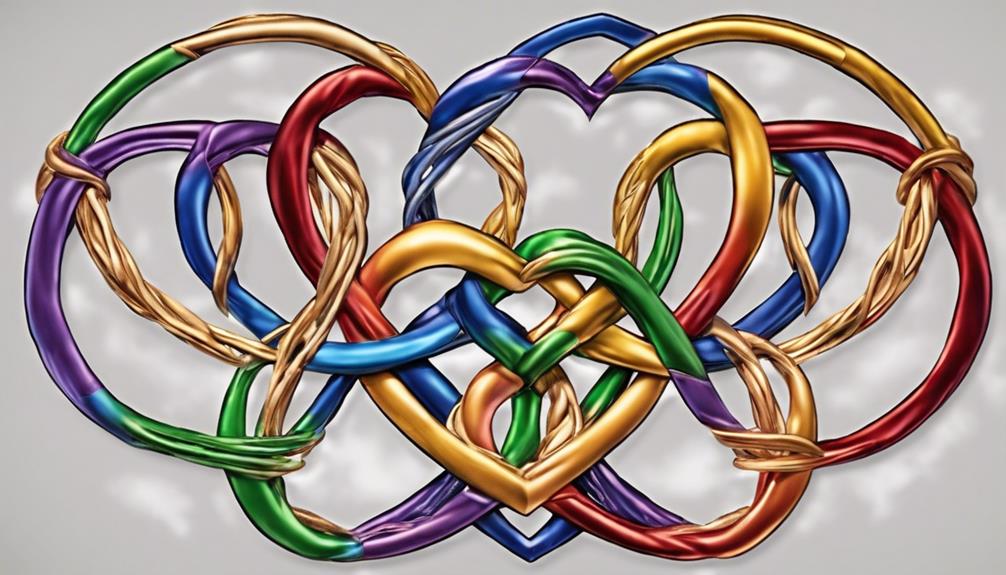When examining the connection between ethical non-monogamy and polyamory, it’s like differentiating between two intersecting circles on a Venn diagram. Although these terms have similarities, they also contain slight differences that can impact the dynamics of non-monogamous relationships.
Understanding the distinctions between them can shed light on the complexities of modern relationship structures and challenge preconceived notions about love and commitment. As we unravel the layers of ethical non-monogamy versus polyamory, we may uncover surprising insights that redefine our perceptions of intimacy and partnership in today's diverse society.
Key Takeaways
- Ethical non-monogamy is a broader term encompassing various relationship styles.
- Polyamory specifically involves multiple romantic relationships with deep emotional connections.
- Polyamory emphasizes love and commitment to multiple partners.
- Both ethical non-monogamy and polyamory prioritize consent, honesty, and open communication.
Definitions and Distinctions
In understanding the nuances between ethical non-monogamy and polyamory, it becomes essential to distinguish their definitions and key characteristics clearly.
Ethical non-monogamy, a term encompassing various relationship styles, differs from polyamory, which specifically involves multiple romantic relationships with deep emotional connections.
While polyamory emphasizes love and commitment to multiple partners, ethical non-monogamy prioritizes consensual multiple relationships founded on honesty and openness.
The distinction lies in the level of emotional involvement, with polyamory necessitating a profound emotional connection compared to other forms of ethical non-monogamy.
By recognizing these disparities, individuals can navigate their relationship preferences and boundaries more effectively, ensuring that all parties involved feel valued and respected.
This distinction is crucial in fostering healthy and fulfilling connections between people, emphasizing the importance of clear communication, mutual understanding, and respect for each individual's desires and boundaries in any form of non-monogamous relationship.
Types of Non-Monogamous Relationships

When exploring the realm of non-monogamous relationships, it's crucial to understand the diverse types of arrangements that individuals may engage in. Non-monogamous relationships can take various forms, including casual hookups, swinging, and polyamory. Polyamory stands out for its emphasis on intimate, emotional, and sexual relationships with multiple partners, highlighting commitments to more than one person. Both ethical non-monogamy and polyamory prioritize forming emotional connections and fostering romantic relationships while navigating multiple dynamics simultaneously.
In these relationships, labels such as non-monogamy and polyamory can carry different meanings for different individuals and partnerships. This variance underscores the necessity of clear communication and establishing agreements with all parties involved. Communication and agreements are pivotal in defining the relationship labels and structures within non-monogamous dynamics, ensuring that all partners are on the same page regarding the commitments and boundaries set forth in the relationship.
Practices of Ethical Non-Monogamy
Engaging in ethical non-monogamy requires establishing clear boundaries and fostering open communication among all partners involved. In this environment of trust and respect, the practices of ethical non-monogamy are essential for maintaining healthy relationships:
- Consent is Key: Prioritizing consent ensures that all parties willingly agree to the relationship dynamics, activities, and changes that may occur. It's crucial to continuously check in with everyone involved to ensure ongoing consent.
- Effective Communication: Open and honest communication is the cornerstone of ethical non-monogamous relationships. Discussing feelings, needs, and boundaries helps in building understanding and trust among partners.
- Setting Boundaries: Clearly defined boundaries help establish the framework within which the relationships operate. Respecting each other's boundaries is vital for creating a safe and secure space for all individuals involved.
Debunking Misconceptions

Navigating the distinctions between ethical non-monogamy and polyamory is essential in dispelling misconceptions and fostering healthy relationship dynamics centered on consent and respect. Both ethical non-monogamy and polyamory involve consensual multiple relationships, emphasizing honesty, transparency, and mutual consent.
Contrary to common misconceptions, ethical non-monogamy isn't synonymous with infidelity; instead, it prioritizes communication, respect, and setting clear boundaries among all partners involved. By understanding these differences, we can debunk myths that cloud the understanding of these relationship dynamics.
It's important to recognize that both ethical non-monogamy and polyamory underscore the significance of consent, honesty, and respect in navigating multiple relationships. By promoting open dialogue and mutual understanding, individuals can cultivate relationships that are built on trust and authenticity.
Embracing these principles not only challenges misconceptions but also cultivates a culture of respect and understanding within the realm of diverse relationship structures.
Ethical Non-Monogamy Vs. Polyamory
Understanding the distinctions between ethical non-monogamy and polyamory is crucial for individuals navigating their preferences and boundaries in non-monogamous relationships. Here are three key points to differentiate between these diverse relationship structures:
- Ethical Non-Monogamy Versus Polyamory: Ethical non-monogamy serves as a broader umbrella term encompassing various consensual non-monogamous relationships, while polyamory specifically involves having multiple romantic relationships with emotional connections.
- Relationship Styles and Structures: Polyamory focuses on multiple romantic relationships, whereas ethical non-monogamy allows for a spectrum of relationship styles beyond just romantic involvement, including open relationships, swinging, and polyfidelity.
- Core Values: Both ethical non-monogamy and polyamory emphasize essential values such as consent, honesty, and open communication among all partners involved, fostering trust and understanding within the relationships.
Frequently Asked Questions
What Is Non-Monogamous Polyamorous?
Non-monogamous polyamory involves engaging in multiple romantic relationships with the consent of all partners. It focuses on emotional connections and commitments to multiple partners simultaneously.
Participants prioritize respect, consent, and transparency in their relationships, emphasizing clear communication, honesty, and mutual understanding. Building intimate relationships with love and emotional depth is at the core of polyamory.
It's about fostering connections that honor everyone involved and create a supportive, loving environment.
Why Is Polyamory Ok but Not Polygamy?
Polyamory is accepted while polygamy might face scrutiny due to historical associations.
In polyamory, the focus is on consensual, emotional connections with all partners, fostering honesty and respect. This differentiates it from polygamy, which can involve power imbalances and cultural contexts that may not align with modern ethical standards.
Understanding these distinctions highlights why polyamory is seen as acceptable compared to polygamy in many contemporary conversations about relationships.
Is ENM the Same as Swinging?
Enm and swinging share similarities but aren't the same.
Swinging typically focuses on recreational sexual encounters without emotional attachments, often involving couples engaging with others for pleasure.
On the other hand, ethical non-monogamy (ENM) encompasses a broader spectrum of consensual non-monogamous relationships, including polyamory, which emphasizes emotional connections and multiple romantic relationships.
Both swinging and ENM require consent, communication, and mutual agreement, but they differ in their primary focus.
What Is ENM Vs Poly Vs Open Relationship?
We understand the nuances between ethical non-monogamy (ENM), polyamory, and open relationships. ENM involves diverse relationship structures beyond just polyamory, emphasizing consent and honesty.
Polyamory focuses on emotional connections with multiple partners, while open relationships prioritize sexual freedom.
Knowing these distinctions helps establish clear boundaries for healthy non-monogamous relationships.
As we navigate preferences, understanding these dynamics is key for fostering fulfilling connections.
What is the Difference Between Ethical Non-Monogamy and Polyamory?
Ethical nonmonogamy is a broad term that encompasses many relationship styles, including polyamory. The main difference lies in the ethical component—polyamory emphasizes consensual, romantic relationships with multiple partners, while ethical nonmonogamy may also include other forms of non-exclusive relationships, like open and swinging arrangements.
Conclusion
As we navigate the seas of ethical non-monogamy and polyamory, let's remember that our relationships are like delicate gardens, requiring tender care and communication to flourish.
Just as each flower in a garden brings unique beauty, each partner in our relationships brings their own light and love.
Let's nurture these connections with respect, honesty, and consent, creating a tapestry of love that's vibrant, diverse, and ever-evolving.
Let our hearts be open to the endless possibilities of ethical non-monogamy and polyamory.
Augustus is the visionary leader and Editor-in-Chief of Personality-Test.net. With an unwavering commitment to quality and authenticity, he oversees all content, ensuring it enlightens and empowers our audience. Augustus believes deeply in the transformative power of self-awareness and is dedicated to making Personality-Test.net a beacon for those on a journey to understand themselves better.










